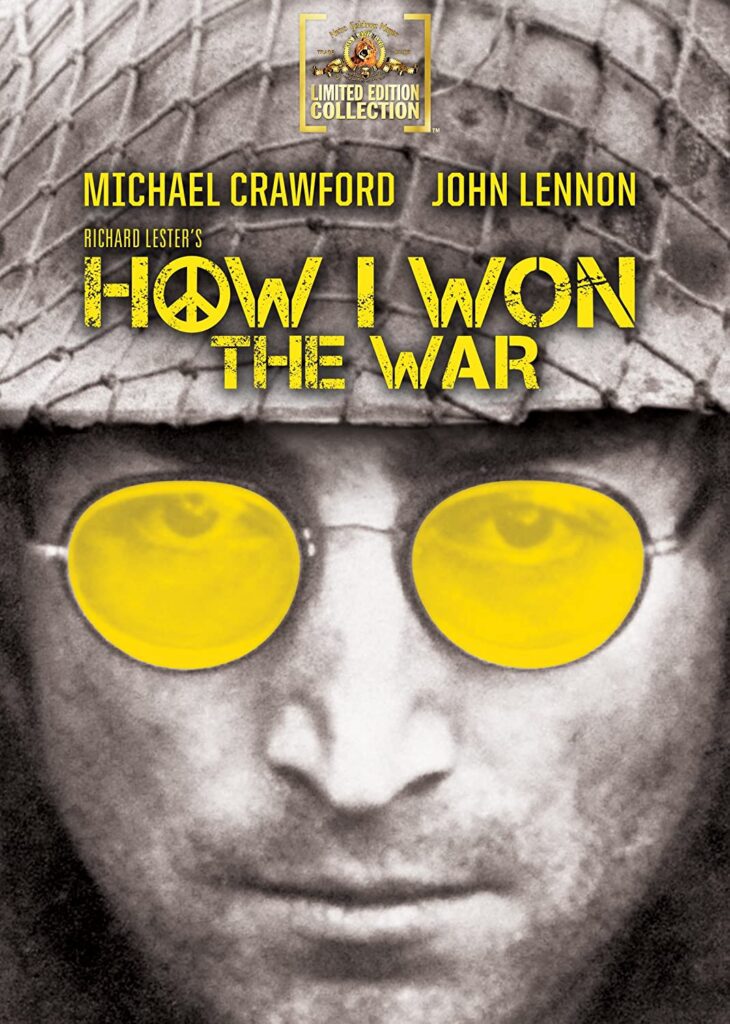
After the success of A Hard Day’s Night and Help!, director Richard Lester tried his hand at making an anti-war film. He enlisted the aid of John Lennon — which was sure to attract viewers — and a young, pre-Phantom Of The Opera Michael Crawford for his 1967 release, How I Won The War. Panned by critics and fans at the time that may have been expecting more madcap Beatles adventures with Lennon and oft misunderstood, the film lampoons the whole notion of war and the class divide between the British officers and enlisted men.
Set in the northern Africa desert during World War II, How I Won The War stars Crawford as the dimwitted Lieutenant Goodbody who is tasked with leading the equally dimwitted Fourth Musketeers regiment. Their main goal is to construct a cricket pitch behind enemy lines per their superiors’ request. The gung-ho Goodbody doesn’t have much use for his soldiers (and the theme seems to be that there is a class divide between officers and enlisted men in the British military) and they for him as there are several instances when one or more characters plot to kill Goodbody.
The story is told through a series of flashbacks as Goodbody had been captured by the Germans. Throughout the film, Goodbody converses with his captor, Nazi officer Odlebog (Karl Michael Vogler), who, after Goodbody asks how many Jews he had killed, tries to point out to Goodbody that military officers aren’t that different, regardless of which side they are on, calling him a Fascist in the process. Goodbody is taken aback, saying, “Am I? But I don’t particularly dislike Jews.” Goodbody is naive enough to think he has won the war, as he “buys” the last remaining bridge over the Rhine River from Odlebog. This is in spite of the losses suffered by his regiment in particular.
Fans of Lester’s Beatles movies will enjoy the basic training scenes, as the hapless Musketeers try to get into fighting shape. Absurdist humor persists throughout. There is a scene where two British officers collect war trading cards depicting the types of war they’d like to engage in. Another of the soldiers first appears to be a comedian, then appears in black face and sets his unit’s own truck on fire to stop the soldiers from stealing. A soldier whose leg had been torn off sees his wife in a vision. He complains that it hurts and she tells him to run it under a tap. Dark humor for sure, but also illustrating the war machine in general and how soldiers were expected to fall in line and not complain.
Lennon has a small, but memorable part as Gripweed, his trademark Beatles humor shining through. In one scene, he is asked if he is married, to which he replies, “No, I play harmonica.” He also inadvertently causes the troops to suffer from heat exhaustion when, in an effort to make it lighter, he lets all the water out of the roller they had been pushing. It’s unfathomable that a soldier would ever do such a thing, but the point is these were idiotic soldiers fighting what they believed to be a more idiotic war. While World War II was generally considered a “just” war, Vietnam was escalating at the time and it is possible that is the war this film was protesting.
The film utilizes a number of different techniques, combining war films with the acted scenes and tinting the screen to represent the various stages of the war. It also breaks the fourth wall, with characters speaking directly to the camera. As a reminder of what was lost, each dead soldier returns, painted entirely green, red or blue, not unlike a toy army figure. Their faces are obscured and they remain silent while Goodbody is indifferent to them.
The film is part of the MGM Limited Edition Collection and is available on DVD for the first time in America. The disc includes the original theatrical trailer. How I Won The War is a decidedly British film. The accents and expressions are often hard to understand and repeated viewings are almost necessary to get all the jokes and social commentary going on. The film could probably a delve a little further into its anti-war stance as it is easy to forget that is the point with all the strange happenings, but when it works, it is a fine satire that is worth a look for fans of Crawford, Lennon or British satire.